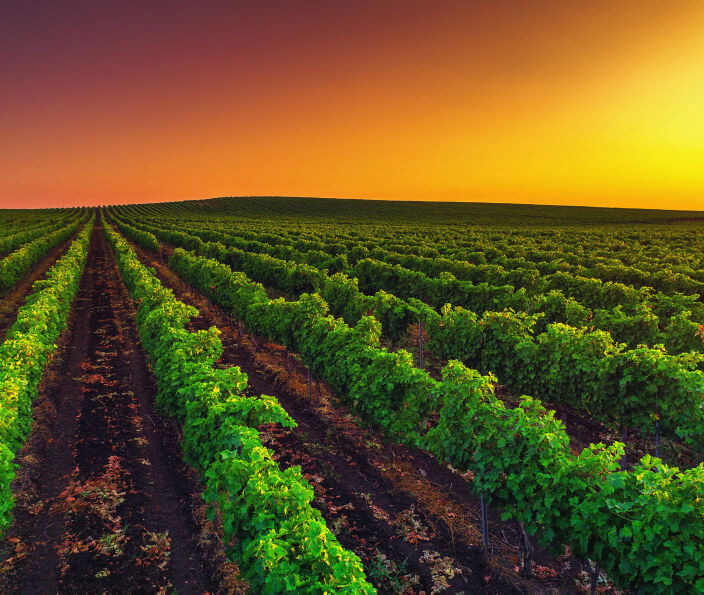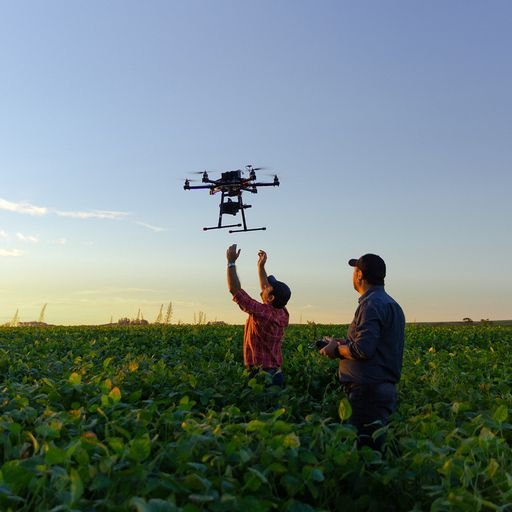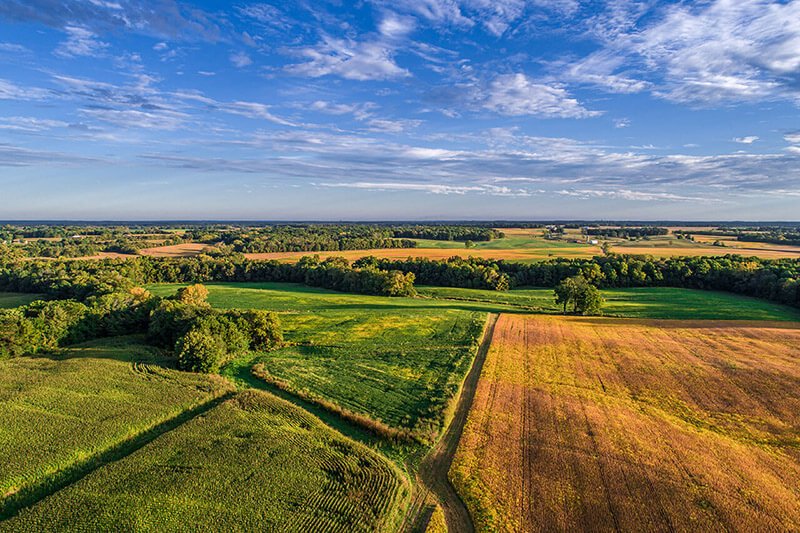
Agriculture
Commercial agricultural properties are used to generate revenue through the production of crops for human consumption, such as fruits, vegetables and meat, or raising livestock for sale. Agricultural land can include farmland, ranches, orchards, vineyards and other types of agricultural operations. Some agricultural properties may include existing infrastructure like barns, silos, irrigation systems, poultry houses and greenhouses, which can increase the value of a property. As with other types of commercial real estate, a property’s value and potential for revenue are influenced by several factors, including location, accessibility, market demand and the quality and maintenance of infrastructure.
Coldwell Banker Commercial® affiliated professionals with agricultural expertise are well-versed in the unique opportunities and challenges that shape successful agricultural land transactions.
Business Sectors
Farmland
Large tracts of land devoted to agriculture, farmland is used for growing crops and rearing livestock to produce food for humans.
Ranchlands
These large, undeveloped land tracts are used for raising and breeding livestock such as cattle, bison and sheep.
Orchards
Orchards are properties dedicated to growing trees and shrubs that produce fruit and nuts for human consumption, such as apples, oranges, peanuts and pecans.
Vineyards
Properties devoted to growing grape-bearing vines, vineyards are used to provide grapes for wine, non-alcoholic grape juice, table grapes and raisins.
Agricultural Buildings
Structures used for storage, shelter and other agricultural purposes include barns, greenhouses, shade houses, farm offices, storage buildings, silos and poultry houses.
Your Trusted Guide
A Coldwell Banker Commercial affiliated professional can provide the assistance investors need for agricultural property transactions. Through property assessments and analyzing the market, they can help determine a property’s value and potential for revenue so you can evaluate if the property is financially viable and sustainable. Their expertise may include property financial analysis, risk management strategies, property marketing and helping you work with your legal advisor to navigate complex legal and regulatory requirements. By leveraging our extensive CBC® network, our affiliated advisors can help a smooth and successful transaction for an agricultural property.
Our Services
-
Property Assessment – CBC affiliated professionals can help you determine an agricultural property’s value and potential for revenue based on location, accessibility, size and layout, infrastructure and buildings, topography, soil quality, drainage and access to water and irrigation.
-
Market Analysis – Our experienced affiliated professionals can provide insights into the demand for agricultural properties, the prices of similar properties and the outlook for the agricultural real estate market. They may help you or help you engage with experts who can evaluate factors such as economic conditions impacting farming, food and commodity trends, the demand for specific products or crops, zoning regulations, environmental factors, competition and supply of agricultural properties in the area.
-
Financing – Your CBC affiliated professional can provide insights to help you make informed decisions about financing, loan options, budgeting, risk management and tax incentives for the property.
-
Use Recommendation – CBC affiliated professionals can work with you to help you determine the best use for your agricultural property.
Latest Agriculture News
Stay informed with the latest commercial real estate market reports,
trends and industry news
from
Coldwell Banker Commercial.
-
 Agriculture
AgricultureFrom Farm to Byte: The Convergence of Technology and Agriculture Real Estate
Late last year, the New York Times reported farmland values hit record highs. In 2022, cropland values increased by 12.4% nationwide, and Farmers National Company...
-
 Agriculture
AgricultureInvesting In Commercial Real EstateWhat Is Commercial Real Estate?
Investing in real estate can be a way to earn passive income and increase your wealth. While plenty of investors have success in residential real...
Other Property Types

Hospitality
Hospitality properties require specialized understanding of both real estate and operations. Coldwell Banker Commercial affiliated hospitality professionals offer experience in hospitality occupancy, real estate, and valuation and will help you find the right space for your goals.

Industrial
Coldwell Banker Commercial affiliated professionals' industry knowledge makes us well-positioned to match you perfectly with your ideal commercial properties.

Multifamily
Multifamily residential properties can be a lucrative investment and provide a stable long-term income opportunity. With deep connections across the industry and in local communities, your CBC affiliated professional can open the door to potential investors and tenants.

Office
Whether your business needs to lease or sublease office space or acquire or sell an office building, Coldwell Banker Commercial affiliated professionals can develop a customized solution tailored to your specific goals.

Retail
Coldwell Banker Commercial affiliated professionals who specialize in retail can help owners maximize the value of their property prior sale through recommended upgrades, rehabilitation, market repositioning and helping secure anchor tenants.

Distressed
Coldwell Banker Commercial affiliated professionals can help to navigate the complexities of a distressed property transaction by providing expertise and guidance to both buyers and sellers to help mitigate risks and maximize returns.

Land
When you work with a Coldwell Banker Commercial affiliated professional who specializes in land, you will receive valuable guidance on available properties with insights into the market, upcoming projects, local zoning and restrictions that could impact your investment.